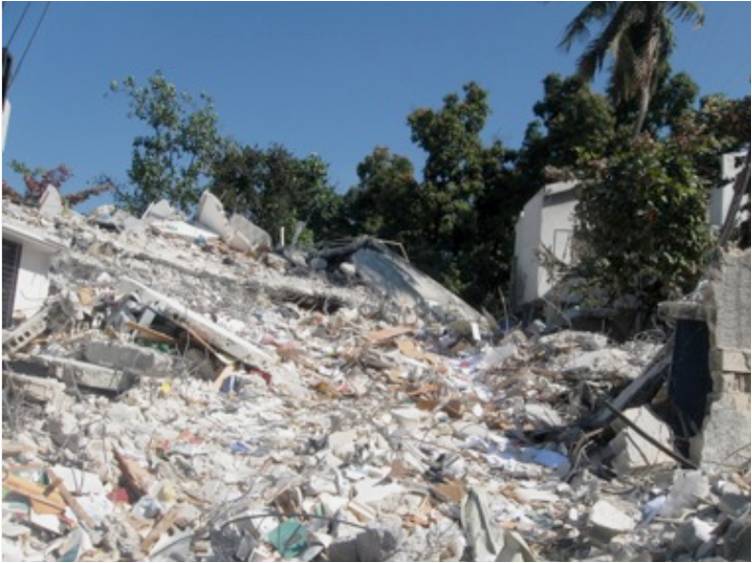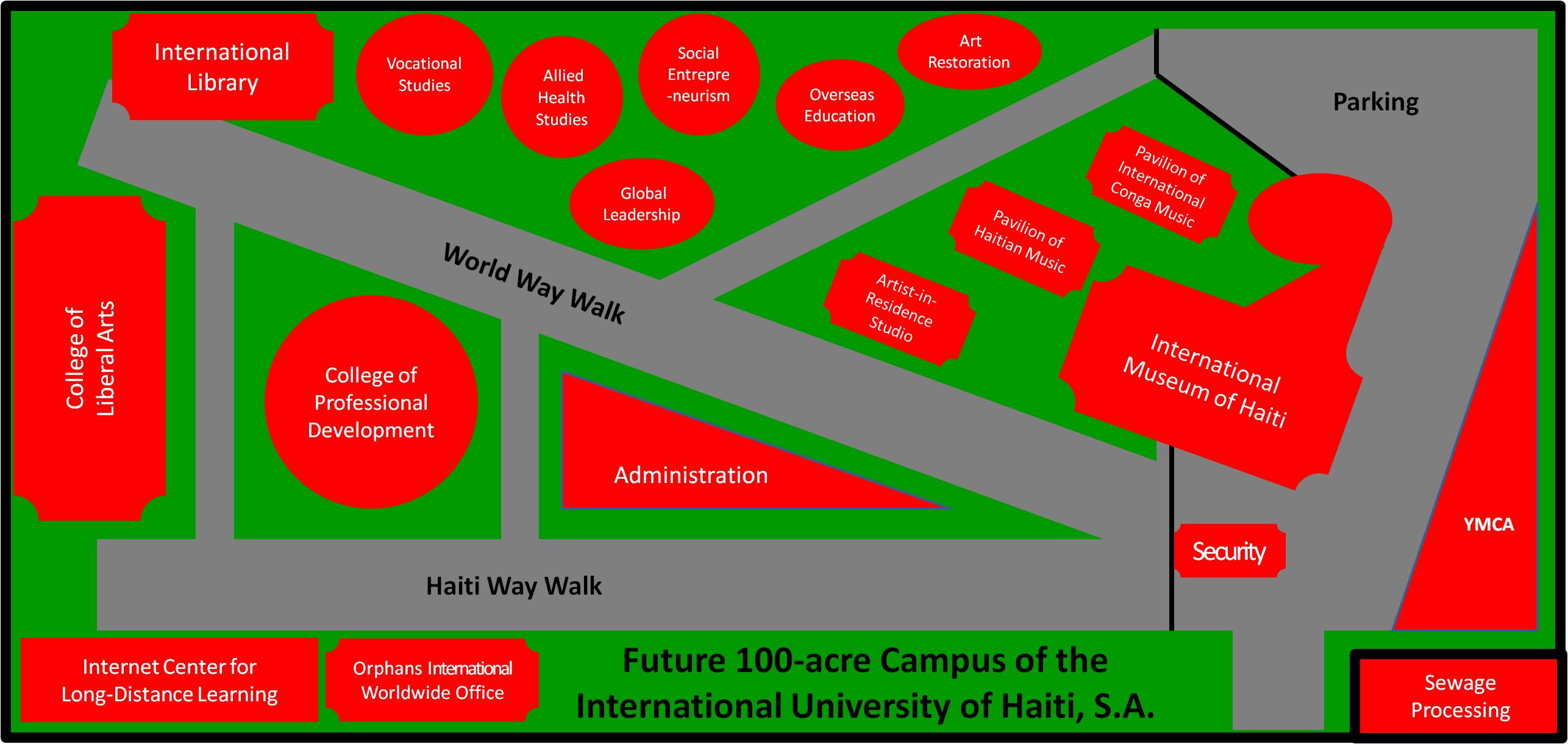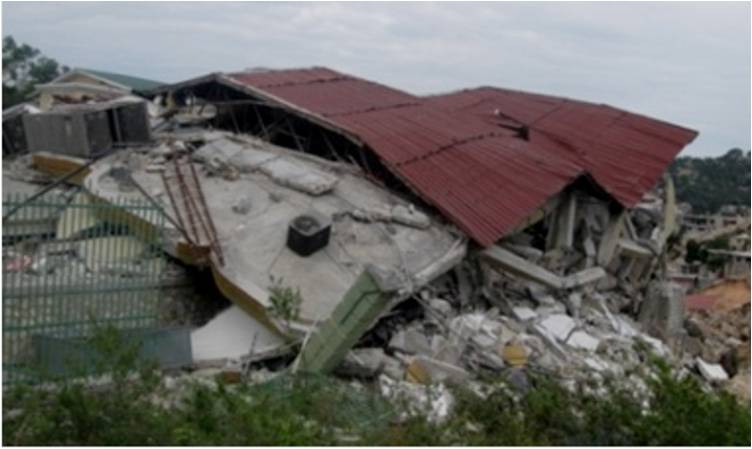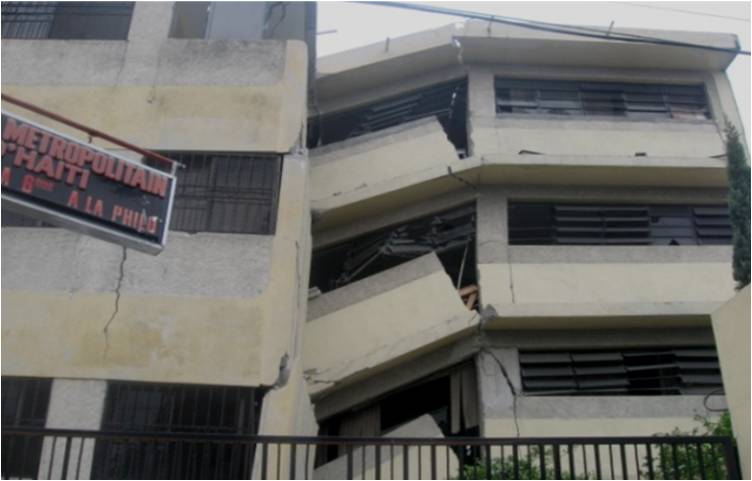The long-awaited post‐earthquake assessment of higher education institutions in the Port‐au‐Prince metropolitan area by the respected Interuniversity Institute for Research and Development (INURED) has been released. The report suggests there is great need for the creation of quality higher education institutions in Haiti. Consequently, I have agreed to found the International University of Haiti (IUH) in Léogâne in cooperation with partners around the world.

The Université de Port-au-Prince in collapse after the January 12, 2010 earthquake.
The university will consist of two colleges, Liberal Arts and Professional Development, and will open its Winter Quarter in January with 100 students. Plans call for 500 enrolled students by Fall Quarter 2011, with 2,000 students eventually. The university will begin in a rented high school facility while its new campus is constructed. Departing from a tradition of Latin in higher education, the school’s mission, “Creating Global Citizens,” will be presented in Arabic and Chinese.
Unlike traditional universities in Haiti, classes will be taught in English, international students will be recruited, and class size will be limited to a maximum of 25 students. Eventually, half of the students are targeted to be international, including Haitian students from the Diaspora.

Future 100-acre Campus of the International University of Haiti in Léogâne.
In the preface to the 22-page INURED report, Dr. Louis Herns Marcelin, Chancellor of INURED, states:
The goal of this study is to contribute to a national and international dialogue and to recommend solutions to the higher education challenges facing the nation. We identify deficiencies of the current system that obstruct high student enrollment and high-quality research in Haitian universities.
These challenges include the high concentration of universities in the capital, the lack of an effective overarching governing body to regulate university accreditation, low investment in scientific research and training, as well as inefficiencies in university administration.The report documents the condition of the higher education institutions after the January 12th earthquake that leveled most of the major institutions in the Port-au-Prince metropolitan area. It cannot be overemphasized that higher education be a priority for Haiti’s rebuilding strategy. Haiti has one of the youngest populations and there is a critical need for young, skilled professionals to rebuild Haiti in the years and decades ahead.

The National School of Administration and Finance (ENAF) after the earthquake.
INURED Chancellor Marcelin continues:
As we redefine Haitian society, we must reform higher education institutions and protect them from the politicization that has hindered scientific inquiry and effective collaboration between these institutions in Haiti. The nation has suffered an irreparable loss of heritage and human capital. Many universities will likely never be rebuilt.
The need for additional studies of the impact and implications of this disaster cannot be overstated. The recommendations of this report urge decision-makers and donors to consider short and longer-term investments that reflect the urgency of higher education as a tool to create leadership for Haiti’s future on par with other priority areas including agriculture, health, and economic development. Strategic investment with smart policy reform in the higher education system will ensure Haiti’s longer-term recovery and development goals.

Temporary Campus of the International University of Haiti in Léogâne.
The mission of the International University of Haiti is Creating Global Leadership through providing students with a combination of Liberal Arts for critical thinking and Professional Development for specific skills toward building a New Haiti. Each student is strongly encouraged to major in one field and minor in the other. Fifty-two students are already enrolled. Tuition is set for US$600 per quarter for ten credits, with 120 credits required to graduate. A degree would cost only $7,200 over four years – affordable to those of modest means. The new university will cooperate with Haitian micro-lenders to accommodate student loans.
The need for the new university is especially apparent given the state of Haitian higher education post-quake:
Ninety percent (90%) of the higher education system consists of private universities of which most are entirely unregulated, contributing to the poor quality of higher education.
Almost ninety percent (87%) of Haiti’s universities are located in the affected region of Haiti, within or in close proximity to Port-au-Prince. Physical damage has been significant for a majority of the institutions.
Of the 32 major universities surveyed in INURED’s preliminary study, 28 were completely destroyed and the other four seriously damaged.

The National School for Technology (ENST) in the capital after the earthquake.
INURED’s report notes additional damage to Haiti from the devastating earthquake:
A large segment of Haiti’s emerging skilled professionals were killed. Estimates of deaths are imprecise, however. In a sample universities surveyed, between 120 to 200 professors and administrators and 2,599 to 6,000 students may have perished as a result of the earthquake.
An incalculable umber of professors, professionals and students fled Haiti after the earthquake, contributing to the brain-drain of these critically needed groups. Most of the fellowships and international scholarships granted to Haiti will compound the emigration of Haitian scholars to foreign countries. The solution for building Haitian competence must be built up from the ground and on site in Haiti.
In their findings and recommendations, INURED states that the impact of the earthquake on an already-fragile higher education system forced decision-makers and international donors as well as higher education leaders to think critically about the relationship between higher education and Haiti’s overall recovery and development.
The Hon. Marcel Duret, former Haitian Ambassador to Japan, supports the creation of The International University of Haiti in Léogâne:
The International University of Haiti aims at provoking the emergence of a new generation of Haitians whose characters are anchored in Haitian values and culture and yet who are willing and able to contribute to make the world a better place to be by pursuing peace and sustainability for all mankind.
Before the January 12, 2010 earthquake, the Haitian system of higher education comprised about 160 public and private institutions, including 14 public, government-run institutions of higher education. The State University of Haiti (Université d’État d’Haïti, or UEH) has 18 campuses, of which 11 were located in the metropolitan area of Port-au-Prince.
While precise statistics are unavailable, it is clear that the pre-earthquake higher education system served only a tiny fraction of secondary school graduates. In 2007, the Ministry of National Education and Professional Formation (MENFP) reported the university population of Haiti was approximately 40,000 students. Of this number 28,000 (70%) were in public universities and 12,000 (30%) in private ones.
INURED’s report finds that Haiti’s university system is oftentimes unable to effectively serve all qualified candidates, so that many qualified high school graduates accept scholarships to the Dominican Republic, Canada, or the United States. Political turmoil, economic, and social problems force a significant proportion of graduates of the system, educated at the expense of Haitian taxpayers, to emigrate to North America and Europe.
The International University of Haiti will have as series of twelve Institutes that will include Allied Health Studies, Art Restoration, Global Leadership, International Film Institute, Long Distance Learning, Overseas Educational Opportunities, Social Entrepreneurism & Microfinance, in addition to Vocational Studies. Further, there are plans to build The Haitian Museum of Art and International Library of Haiti on the campus, as well as The University Center & Annex.
As the former president of Yale University, Bartlett Giamatti, once stated, “A liberal education is at the heart of a civil society, and at the heart of a liberal education is the art of teaching.” The new university’s educational approach stresses both a strong faculty and a liberal education — “Liberal Arts in Action,” as per Tokyo’s incomparable International Christian University. Science, music, theater, English, history, geography, math, economics, anthropology, and psychology will be offered, preparing students for careers in medicine, law, business, the arts, the humanities, and the social sciences.
Dr. Linda Stillman, a mentor to university students of First Families from around the world, adds:
U.N. Secretary General Ban Ki Moon has called the 21st Century the Era of Communication to advance global social change. The International University of Haiti will feature the Young Global Leadership Institute that I will lead as a director of the James Jay Dudley Luce Foundation.
Connection and collaboration are key to an integrative approach towards effective and ethical leadership. YGLI will focus on culture and communication connected to positive global psychology to develop the human relational dimension in our aspiring young global leaders. The program will offer seminars and projects that can be applied towards the students’ degrees. It will also offer experiential learning in global leadership through its New York program, currently, planned at the Cornell Conference Center in midtown Manhattan.
The millennial generation (born 1985-2005) has just arrived as aspiring young global leaders who want to make a difference in the world. They are most aware of the daunting global challenges they are inheriting and seek mentors. YGLI will provide individualized mentors to the millennials in their quest to achieve a more peaceful, prosperous and productive global society to help humanity.
The Winter Quarter is scheduled to start with four courses offered through the College of Professional Development (English 101, Information Technology 101, Public Administration 101, and Communications: Media 101) and three in the College of Liberal Arts (French 101, Creole 101, and Haitian History 101). The cholera epidemic may postpone the university’s opening.
The International University of Haiti will open on Rue St. Croix in Léogâne in January 2011. Accreditation will be sought in 2011 from the Haitian Ministry of Education, the Universities of the West Indies, and various North American university partners. You will soon be able to personally contribute to the University through the James Jay Dudley Luce Foundation.
Photos of the earthquake devastation courtesy of INURED. Copyright INURED 2010.